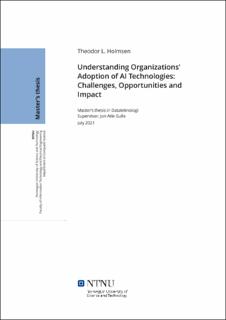| dc.contributor.advisor | Gulla, Jon Atle | |
| dc.contributor.author | Holmsen, Theodor L. | |
| dc.date.accessioned | 2021-10-26T17:21:34Z | |
| dc.date.available | 2021-10-26T17:21:34Z | |
| dc.date.issued | 2021 | |
| dc.identifier | no.ntnu:inspera:74730513:29038674 | |
| dc.identifier.uri | https://hdl.handle.net/11250/2825825 | |
| dc.description.abstract | Der hvor mange publiserte verk og forskningsbidrag har lett for å bli påvirket av diverse eksterne krefter, vil en masteroppgave fra NTNU ha fordelen av å representere et akademisk forankret produkt. Denne oppgaven utforsker potensialet ved å sammenligne og karakterisere organisasjoner på tvers av industrier, og se hva slags verdi som kan bli hentet ut i kontekst av en organisasjons forhold til kunstig intelligens. Informasjonsinnhenting har blitt gjort gjennom kvalitative and kvantitative forskningsmetoder hvor intervjuer og en undersøkelse står i sentrum, og de ulike organisasjonene utgjør offisielle samarbeidspartnere til oppgaven.
Totalt 8 ulike temaer relatert til hvordan den enkelte organisasjon forholder seg til og definerer adopsjon og bruk av AI, har blitt trukket ut fra intervjuene hvor ulike sammenligninger er understøttet og validert gjennom direkte sitater fra de ulike representantene. En undersøkelse har også bidratt til å ytterligere karakterisere forskjeller og prioriteter mellom de ulike partnerne. Kunnskapen har bidratt til å stadfeste at verdi kan hentes ut i form av den lærdommen og erfaringen de ulike partnerne "tar med til bordet", både likheter og ulikheter, og gjennom å vise at det er hensiktsmessig å kunne utføre en studie av denne typen.
En diskusjon av forskningen og state-of-the-art i respekt av AI-modenhet har resultert i et grovkornet sluttprodukt, en tilnærming mot en AI maturity model. Tilnærmingen er uttrykt gjennom fem definerte dimensjoner i forhold til organisatorisk AI: technical, data, people, societal, og responsible, og fem nivåer av AI-modenhet: initial, believer, adopter, managed, og optimized. Dette fundamentet utgjør et viktig resultat med et potensial for å kunne fortsette forskningen der denne oppgaven slapp, eller ta det i en helt ny retning. | |
| dc.description.abstract | Where many published works and research contributions can easily be influenced by various external forces, a master thesis from NTNU has the benefit of representing an academically-rooted product. This thesis explores the potential of comparing and characterizing organizations across industries, and see what kind of value can be extracted in the context of an organization's relationship with artificial intelligence. The information retrieval has been made possible through qualitative and quantitative research methodologies were interviews and a survey takes center stage, and the different organizations make up the official collaborating partners of the thesis.
In total, 8 different themes related to how an organization relates to and defines the adoption and use of AI have been extracted from the interviews where different comparisons are supported and validated through direct quotes from the different representatives. A survey has also contributed to further characterize differences and priorities between the different partners. The knowledge has contributed to confirming that value can be extracted in the form of the learning experience and experience which the different partners bring to the table, both similarities and differences, and by showing that it's relevant to conduct a study of this kind.
A discussion of the research and state-of-the-art in respect of AI-maturity has resulted in a coarse end-product, an approach towards an AI maturity model. The approach is expressed through five defined dimensions in relation to organizational AI: technical, data, people, societal, and responsible, and five levels of AI-maturity: initial, believer, adopter, managed, and optimized. This foundation constitutes an important result with the potential to continue the research of this thesis, or to guide it in a new direction. | |
| dc.language | eng | |
| dc.publisher | NTNU | |
| dc.title | Understanding Organizations’ Adoption of AI Technologies: Challenges, Opportunities and Impact | |
| dc.type | Master thesis | |
